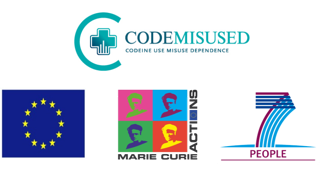Misuse of opioid-based pain medicines has been increasing over the past ten years. In some cases, these drugs are diverted from approved medical use and substituted for illicit drugs such as heroin. In other cases, people develop dependence after a period of use for legitimate medical reasons, such as treatment of pain, leading to excessive and long-term use.
Codeine is a mild opioid used for treatment of pain, coughing, and diarrhoea. It is available in the form of tablets and as cough syrups, as prescription-only medicines and from pharmacies without the requirement of a medical prescription (sold ‘over the counter’ under supervision of a pharmacist). This is different from most pharmaceutical opioids that are only available as prescription-only medicines, and it presents a specific challenge: On one hand, patients should have access to some medicines without the need for a prescription when they experience pain from self-limiting conditions. On the other hand, codeine is increasingly subject to misuse and more adverse events have been reported in the last ten years, including dependence. Getting the balance right is not an easy task for regulators of access to medicines.

The study
The EU funded project CODEMISUSED is an international study conducted in South Africa, Ireland, and the UK. It brings together researchers with expertise in drug harms and addiction and pharmacists who are in daily contact with patients taking codeine. The overarching aim of the project is to uncover use and misuse of this drug as well as to reduce harm and improve pharmacy dispensing and drug treatment options.
Codeine use and the Internet
The Internet has profoundly changed how people source information and disseminate their experiences concerning the use of medicinal drugs. Information is conveniently accessible from a computer, tablet, or smartphone. Communities form online around interests such as the use of medicines, treatment of disease, drug use and drug addiction. Social media play a huge role in communicating codeine use and misuse. Here people share their personal experiences of taking these drugs.
As a consequence of this development, the CODEMISUSED Project includes a number of study packages that use the Internet and social media to collect information about the use, misuse, and harm of codeine consumption. Using specialised software, Twitter posts (or Tweets) with content relating to codeine can be retrieved in large numbers and used for analysis of trends in use. This offers new opportunities to investigate codeine use and misuse and provides access to information about peoples’ experiences of using these drugs, what they think about them, which kinds they consume, and what the effects might be. It also provides information about the use of codeine-containing medicines for non-medical and recreational purposes, such as to induce opioid euphoria. All data is anonymised and can be used without revealing the identity of the person or specific Twitter accounts.
Researchers from the National Addiction Centre are in charge of the UK arm of the Project and are currently engaged in collecting data. This will be ready for analysis later in the year.
More information about the Project is available at: codemisused.org, or by contacting Dr Andreas Kimergård at: Andreas.Kimergard@kcl.ac.uk

The research leading to these results has received funding from the European Community’s Seventh Framework Programme FP7/2007-2013 under grant agreement no 611736.
The opinions expressed in this commentary reflect the views of the author(s) and do not necessarily represent the opinions or official positions of the Society for the Study of Addiction.
